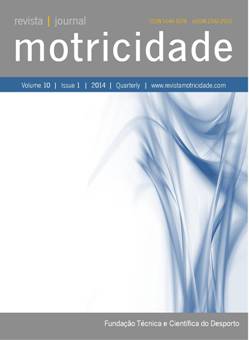Content validation of tactical-technical actions of the Tactical Procedure Knowledge Test - Sporting Orientation
DOI:
https://doi.org/10.6063/motricidade.2124Abstract
The assessment of the level of tactical athlete's performance in competitions, during the training process, youth training or the sport performance allows the improvement of the teaching-learning process in team sports. Therefore this study reports the use of the content validity method with the aim of evaluating actions to compose a sporting orientation test. A panel of judges evaluated the actions regarding the following criteria: clarity of language, practical relevance and item representativeness. The theoretical validation aimed to establish items to create tactical procedure knowledge test to assess children and youth decision-making level in team sports played with hands and/or feet. The results showed how sports actions can become validate as items. The procedure was effective to outline items occurrence as part of empirical validation test approving 16 items of 18 actions with coefficient higher than 0.82. Thus, the study shows that the technical-tactical actions validated by content validity method assess procedural tactical knowledge, which as a test will allow the processes of teaching and learning of tactical ability of sport performance.
Downloads
Published
Issue
Section
License
The authors of submitted manuscripts must transfer the full copyright to Journal Motricidade / Sílabas Didáticas Editions. Granting copyright permission allows the publication and dissemination of the article in printed or electronic formats, and copyrights start at the moment the manuscript is accepted for publication. It also allows Journal Motricidade to use and commercialise the article in terms of licensing, lending or selling its content to indexation/abstracts databases and other entities.
According to the terms of the Creative Commons licence, authors may reproduce a reasonable number of copies for personal or professional purposes, but without any economic gain. SHERPA/RoMEO allows authors to post a final digital copy (post-printing version) of the article on their websites or on their institutions' scientific repository.


